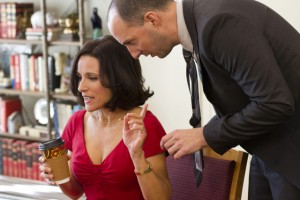 “Veep” (HBO, 10 p.m.) is a raucous, profane, adrenaline rush of a political sendup, set in the second most powerful office of the land, where every political action seems overshadowed by the oval office (whose president never appears), and every action seems either botched or fumbled, before press and political foes who love to see you fail.
“Veep” (HBO, 10 p.m.) is a raucous, profane, adrenaline rush of a political sendup, set in the second most powerful office of the land, where every political action seems overshadowed by the oval office (whose president never appears), and every action seems either botched or fumbled, before press and political foes who love to see you fail.
The many talents of Julia Louis-Dreyfus are at their comic heights here as the somewhat at wits end Vice President Selina Meyer. The material is already funny, but she’s able to kick it even higher with her bearing, voice and extra touches.
Few comedies come close to the ensemble excellence at play here, with Tony Hale, Matt Walsh and Anna Chlumsky (not so long ago, the child star of “My Girl”) among them.
Armando Iannucci is the reason it all works. His work on the various Alan Partridge projects for the BBC was hilarious enough, but his work on the series “The Thick of It” and the film “In the Loop” honed his penchant for political farce, which he delivers to the American system with the help of consultants like the former New York Times political columnist Frank Rich.
And as sharp as it all is, it almost doesn’t fit next to the other worthwhile Sunday night comedy on the network, “Girls” (HBO, 10:30 p.m.), whose more subtle hipster approach is much different. They’re both great though.
“Veep” seems perfectly suited for the logjam of contemporary politics, Iannucci told reporters at the TV Critics press tour earlier this year.
“Watching the political process at the moment, your instinct now is to laugh because the alternative is to cry,” he said. “I think a lot of people are genuinely frustrated because they don’t understand why so many clearly very able people concentrated in one locale can’t sort something out. So actually, I think it’s it seems to be the right moment to come up with something that starts showing you how this happens.
Not that you need a political degree to understand it.
“We very much wanted to make something that appealed to the general viewer,” Iannucci said. “Which is why it’s not about we don’t really know which party Selina is in. We never mention the party.”
In addition, “We never name the President because it’s not about the minutia of policy,” he said. “It’s all about how human beings operate in that kind of world really.”
Asked about how it compares to, say, “The West Wing,” Iannucci said, “I always felt that there are two types of ways in which Washington has been portrayed before, which is the very noble everyone is very good at their job, and it’s for the highest ends and or else it’s a very cynical, corrupt, rather sinister world.
“I actually believe the truth is somewhere in between. It’s fundamentally a lot of people trying to get on with a job. Some of them are good at it, and some of them are bad at it. Some of them are very ambitious. And the worst ones are the ones who are bad at it but who think they’re good at it. They’re the most dangerous ones.
“I’m a big fan of ‘The West Wing,’” he said. “But as I said, I think at this particular point I think I think that portrayal of Washington as a clean and noble heartland just wouldn’t wash with the public. We’ve seen too much now.”
Concentrating on the vice president provides an inherent comic hook.
“For me, there was something in that role of Vice President that had comic potential and not the comedy that you would initially think about. I know that the Vice President’s role is often seen as like a standing joke. People attach figures like Dan Quayle to it. But actually, that role has changed radically.
“I mean, Dick Cheney was a very powerful politician as Vice President. Al Gore had a whole set of agreements that he’d agreed with Bill Clinton prior to becoming Vice President. “The thing about it is you what makes it, for me, so potentially funny is you’re so near and yet so far. You’re so close to power, and yet you’re removed from it. And your identity is entirely at the whim of the President. If the President likes you, he’ll give you power. If he doesn’t like you, he’ll take it away from you. So there’s that: the fact that you’re not in control of your own destiny.
“It is a very powerful position,” said Louis-Dreyfus, “and yet at the same time, I don’t think there’s a politician out there that you would say that they aspire to be Vice President.
“It’s a job that more or less requires you to have a badge, a lapel button on you saying, ‘I came second’ all the time,” Iannucci said. “Which is something you have to kind of live with.”